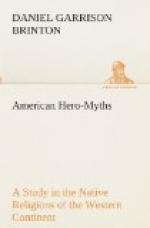At the time she fell from the sky she was pregnant, and in due time was delivered of a daughter, whose name, unfortunately, the legend does not record. This daughter grew to womanhood and conceived without having seen a man, for none was as yet created. The product of her womb was twins, and even before birth one of them betrayed his restless and evil nature, by refusing to be born in the usual manner, but insisting on breaking through his parent’s side (or armpit). He did so, but it cost his mother her life. Her body was buried, and from it sprang the various vegetable productions which the new earth required to fit it for the habitation of man. From her head grew the pumpkin vine; from her breast, the maize; from her limbs, the bean and other useful esculents.
Meanwhile the two brothers grew up. The one was named Ioskeha. He went about the earth, which at that time was arid and waterless, and called forth the springs and lakes, and formed the sparkling brooks and broad rivers. But his brother, the troublesome Tawiscara, he whose obstinacy had caused their mother’s death, created an immense frog which swallowed all the water and left the earth as dry as before. Ioskeha was informed of this by the partridge, and immediately set out for his brother’s country, for they had divided the earth between them.
Soon he came to the gigantic frog, and piercing it in the side (or armpit), the waters flowed out once more in their accustomed ways. Then it was revealed to Ioskeha by his mother’s spirit that Tawiscara intended to slay him by treachery. Therefore, when the brothers met, as they soon did, it was evident that a mortal combat was to begin.
Now, they were not men, but gods, whom it was impossible really to kill, nor even could either be seemingly slain, except by one particular substance, a secret which each had in his own keeping. As therefore a contest with ordinary weapons would have been vain and unavailing, they agreed to tell each other what to each was the fatal implement of war. Ioskeha acknowledged that to him a branch of the wild rose (or, according to another version, a bag filled with maize) was more dangerous than anything else; and Tawiscara disclosed that the horn of a deer could alone reach his vital part.
They laid off the lists, and Tawiscara, having the first chance, attacked his brother violently with a branch of the wild rose, and beat him till he lay as one dead; but quickly reviving, Ioskeha assaulted Tawiscara with the antler of a deer, and dealing him a blow in the side, the blood flowed from the wound in streams. The unlucky combatant fled from the field, hastening toward the west, and as he ran the drops of his blood which fell upon the earth turned into flint stones. Ioskeha did not spare him, but hastening after, finally slew him. He did not, however, actually kill him, for, as I have said, these were beings who could not die; and, in fact, Tawiscara was merely driven from the earth and forced to reside in the far west, where he became ruler of the spirits of the dead. These go there to dwell when they leave the bodies behind them here.




